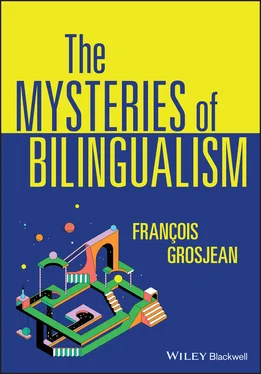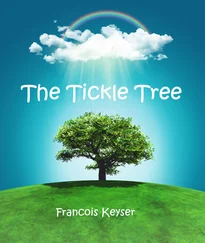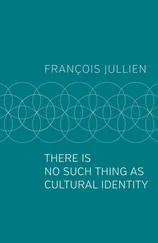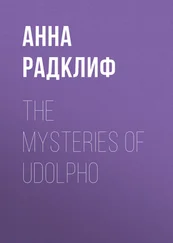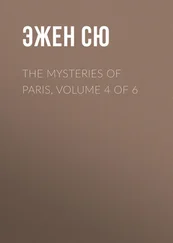This book can be used for courses in psycholinguistics, linguistics, neurolinguistics, cognitive sciences, speech and language pathology, bilingualism, applied linguistics, and first and second language acquisition. It is suitable for upper level BA and BS courses, first- and second-year graduate studies, as well as for laypersons who wish to find out about unresolved issues in bilingualism research.
I would like to thank those at Wiley Blackwell who helped me with the book: Tanya McMullin, Commissioning Editor, who believed in the project and gave me a contract; Rachel Greenberg, Commissioning Editor, who accompanied it through to its completion and production; Clelia Petracca and Anya Fielding, Editorial Assistants; Hannah Lee and Mandy Collison, Managing Editors; John Bowdler, Copy Editor; Kanimozhi Ramamurthy, Content Refinement Specialist; and Gopu Rasuvel, Designer.
Finally, preparing and writing a book such as this one could not have been possible without the kind help of numerous colleagues – experts in their respective domains – who shared with me their publications, answered my questions, and even read and commented on segments of my manuscript, or even on whole chapters. They are: Roman Abel, Dylan Antovich, Mariem Boukadi, Jeffrey Bowers, Mirjam Broersma, Krysta Byers-Heinlein, Jiyoun Choi, Deborah Cobb-Clark, Anne Cutler, Jean-Marc Dewaele, Jennifer Fayard, James Flege, Rosalie Footnick, Mira Goral, David Green, Jason Gullifer, Michael Gurven, Joanne Hans, Ying-yi Hong, Keerthana Kapiley, Michele Koven, Jan Kuipers, Ekaterina Kuzmina, Marjorite Lorch, Ping Li, Sven Matthys, Elke Montanari, Alene Moyer, Elena Nicoladis, Bertrand Ouellet-Léveillé, Christophe Pallier, Ken Paap, Johanne Paradis, Michel Paradis, Silke Paulmann, Lara Pierce, Nairan Ramirez-Esparza, Oliver Robinson, Jenny Saffran, Monika Schmid, Mark Sebba, Wing Chee So, Ágnes Szabó, Debra Titone, Mehrgol Tiv, Janet Werker, and Magdalena Wrembel.
As a sign of my gratitude, I dedicate this book to them.
Part I Bilingual Adults and Children
One of the most complex questions when studying bilingualism is quite simply: Who is bilingual? If you ask bilinguals themselves whether they are bilingual or not, you may come away with affirmative answers but also negative ones, accompanied by remarks such as, “I’m not bilingual (as) I’m not fluent in all my languages,” “I don’t consider myself bilingual since I don’t know how to write my other language,” “I didn’t grow up with two languages, so I’m not bilingual,” and even, “I have an accent in Spanish so I can’t be considered bilingual.” Then, if you look up the word “bilingual” in dictionaries, you will find a variety of definitions, going from, “Having the ability to speak two languages” (Wiktionary), all the way to, “Able to speak two languages equally well” (Longman). And, finally, if you ask linguists their definitions, you also find an assortment of responses, with a preponderance pulling towards the regular use of two or more languages.
Are things a bit more straightforward when you look at the questions in self-report questionnaires given to bilinguals in an attempt to describe their bilingualism? The answer leans towards the affirmative but there is still a lot of variety. Some ask about language dominance, whereas others do not; some include questions about the biculturalism of bilinguals, but others do not; some ask about the bilingual’s accent, whereas other refrain from doing so, and so on. In sum, diversity is found in both how we define bilinguals and how we describe them. This may be due, in large part at least, to the fact that the study of bilingualism is still a rather young science as compared to that of monolingualism.
In the first part of this chapter, we will spend time on how bilinguals and bilingualism have been characterized and how this has changed over time. We will begin by looking at responses from three surveys done with lay people, both monolinguals and bilinguals. Then we will examine the definitions given by dictionaries for the words “bilingual” and “bilingualism.” The entries were written by lexicographers many of whom have linguistics training, so it will be interesting to see if there are any differences with what lay people say. Finally, we will look at the definitions given by language scientists over a span of about one hundred years and examine their evolution.
In the second part, we will present important characteristics of bilingual people (language proficiency, language use, functions of languages, language mode, etc.) and will also examine how they evolve over time. We will end with a quick overview of three well known self-report questionnaires given to bilinguals and see what they have in common and where they differ.
Definitions and Their Evolution
What Lay People Say
When I wrote my first book on bilingualism some 40 years ago (Grosjean 1982), I conducted a short survey in order to uncover the lay person’s understanding of the term “bilingual.” I asked a number of monolingual college students to answer this question: “If someone told you that X was bilingual in English and French, what would you understand by that?” The most frequent response I found (36% of the answers) was that X speaks both languages fluently . This was followed by X speaks English and French (21%), and by X understands and speaks English and French (18%)? Note that the summed percentages of the two latter answers, which basically say the same thing, add up to 39%. The same question asked of a group of bilinguals gave very similar results: X speaks the two languages fluently (31%), and speaks the two languages (46%). Thus, just speaking both languages (which includes both production and perception), gets a bit less than half of the responses in the two groups, and speaking both languages fluently is only just behind, with 36% and 31% respectively. This shows the importance of fluency 1in the participants’ mind, be they monolingual or bilingual.
Both groups were then asked to rate the importance of a number of factors that had been mentioned in definitions of bilingualism, such as being fluent in two languages, having both speaking and writing fluency in them, using two languages regularly, etc. The scale used went from 1 “not important” to 5 “very important.” The monolinguals gave a mean rating of 4.7 for being fluent in two languages, and the bilinguals gave it a rating of 4.4. Speaking and writing fluency in two languages was given a rating of 4.0 by the monolinguals and 3.6 by bilinguals, and equal fluency in two languages was rated 3.7 and 4.1 by the two groups, respectively. Thus, once again both monolinguals and bilinguals felt that fluency in two languages is an important factor in describing the bilingual person.
It is interesting to note that monolinguals differed most from bilinguals on the question of language use, a factor that we will evoke often in this chapter. For monolinguals, the factor labeled “regular use of two languages” received a mean rating of 3 (that is, it was not considered a very important factor), but the bilinguals gave it a mean rating of 4.1, just below “fluency in two languages” (4.4). So here, on language use, monolinguals and bilinguals diverged a bit, probably because bilinguals are more aware of the communicative aspect of being bilingual, that is, using two languages irrespective of your fluency in them.
Where do things stand now? Two surveys were conducted this century, one by Zubrzycki (2019) and one some 13 years before by Sia and Dewaele (2006). Zubrzycki wanted to replicate the Sia and Dewaele study, which asked speakers of at least two languages: “Are you bilingual?” According to the answer they gave, they were placed in the “bilingual” or “non-bilingual” group, and it was shown, among other things, that the self-assessment of second language (L2) proficiency was higher in the “bilingual” group than in the “non-bilingual” group. This was true overall, but also for the four basic skills: Speaking, listening, reading and writing. Zubrzycki conducted the same kind of study but with a slightly different question, “Do you consider yourself bilingual?” He found practically identical percentages to Sia and Dewaele for those who labeled themselves as bilingual or not, and very similar assessment results.
Читать дальше
